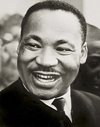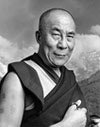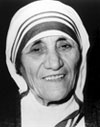They came, they saw and they conquered - with peace and hope. Read about the champions of world peace.
Born an Albanian, the story of Agnes Gonxha Bojaxhiu, better know as Mother Theresa to the world, is one of grit, determination, and divine calling. By the age of 12, little Agnus had decided that she wanted to be a missionary to spread the love of Christ. Mission work brought her to Calcutta but it was the misery and poverty of the poorest of the poor that moved her. She had finally discovered her true calling and working for the downtrodden and the less fortunate was to become the purpose of her life. In 1950, Mother Teresa received permission from the Holy See to start her own order, “The Missionaries of Charity”. She breathed love, life, and hope into millions. Awards came seeking but her comment was, “I am doing my duty, what God wanted me to do”. Mother Theresa was awarded the Nobel Prize for peace in 1979, but for her the true reward was her satisfaction.
 He had a dream - Martin Luther King
He had a dream - Martin Luther King He taught them the power of dreams and they sang along with him “I have a dream”. In 1950's when America was seething under civil rife and racism, Martin Luther King became the voice of the oppressed blacks seeking equal citizenship, through non violence. Always a strong worker for civil rights for members of his race, King imbibed his ideals from Christianity and his operational techniques from Gandhi. He traveled far and wide preaching for justice and equality. He led a massive protest in Birmingham that caught the attention of the entire world. His inspiring “Letter from a Birmingham Jail" became the manifesto of the black revolution. At the age of thirty-five, Martin Luther King, Jr., was the youngest man to have received the Nobel Peace Prize. Martin Luther King was not just an American black leader but also the voice of all the oppressed and the downtrodden millions across the world.
 Peace personified - Mahatma Gandhi
Peace personified - Mahatma Gandhi Born in Gujarat, Mohan Das Karamchand Gandhi was the spiritual and political leader of British India. He rose to prominence as the face of Indian independence during the British regime, but his weapons were that of ahimsa - non violence. Gandhi employed means like Satyagraha and civil disobedience movements to gain India's independence. India was granted independence in 1947, and partitioned into India and Pakistan. Rioting between Hindus and Muslims followed and Gandhi began a fast to stop the bloodshed. After five days, the opposing leaders pledged to stop the fighting and Gandhi broke his fast. Twelve days later he was assassinated by a Hindu fanatic who opposed his program of tolerance for all creeds and religion. On his demise Albert Einstein, the famous physicist remarked, “Generations to come will scarce believe that such a one as this walked the earth in flesh and blood.”
 Battling for peace - Aung San Suu Ki
Battling for peace - Aung San Suu Ki Burma's hope for freedom, Suu Ki is the daughter of Aung San, who is regarded as the founder of modern Myanmar. Suu ki lived outside the country after 1960 and on her return in 1988, she joined the opposition. She soon rose to prominence and her criticisms on Myanmar's military dictatorship earned her the wrath of the authorities. Suu Ki was confined to house arrest for nine years. Though her party won the majority in the elections, the military refused to yield power and her house arrest was extended. Nonetheless, she stayed in Myanmar, continuing to write and speak for her cause. Suu Ki was awarded the Nobel Prize for peace that year and she continues to wage her peaceful battle for peace in Burma.
 Pilgrim of peace - Dalai Lama
Pilgrim of peace - Dalai Lama
“My religion doesn't need temples and complicated philosophy. Our own heart is our temple; the philosophy is kindness.” Dalai Lama, the spiritual leader of Tibet lives up to his principals. His efforts to liberate Tibet from the clutches of China ignited the fire of freedom in Tibetans. Though the uprising was brutally crushed by the Chinese army and the Dalai Lama had to seek refuge in India, he continues to be the lone hope for freedom for the Tibetans. In 1989, the Dalai Lama was awarded the Nobel Prize for peace. It may take a little while for the flag of freedom to flutter in the mountain kingdom but it surely will – because there is a pilgrim who works for it, in the best way possible way, through love, kindness, and compassion.
 On a passionate Mission - Kofi Annan
On a passionate Mission - Kofi Annan
Born in Ghana, Kofi Annan is the seventh Secretary-General of the United Nations. He is also the first to be elected from the ranks of UN staff. Mr. Annan joined the UN in 1962 and though he held senior positions in a diverse range of areas, the mantle of responsibilities always sought him with regard to peace negotiations and settlements. Annan may not be an orator of peace, you will not find him inspiring millions to rise up for peace or lead from the front. He goes about his job in a quiet way through his work field by meeting people, studying their problems and through negotiations. Kofi Annan received the Nobel Prize for peace in 2001. He is definitely one of the leaders of world peace who could rise above color, caste, and creed to see humanity as the larger entity. According to him, “We may have different religions, languages, and skin, but we all belong to one human race”.

For peace and Palestine - Yaseer Arafat
A Noble peace prize winner, Palestinian political leader and president, Yaseer Arafat occupied the center stage of Middle East politics for almost four decades. The Palestinian movement was almost entirely Arafat's creation of which he assumed the leadership at a very young age. Arafat took it through a dizzying series of crises and defeats but also ensured its survival and influence. The best part of the movement was that it disavowed terrorism and followed the path of peace for peace. Arafat's life was a relentless struggle for Palestine and though he died with his dream unfulfilled, Arafat ignited hope and optimism in the heart of many a Palestinian.
Do you have something to add to this topic? Share your thoughts with us at albertindian2000 [@][at] yahoo [. Dot] com
 A life less ordinary - Nelson Mandela
A life less ordinary - Nelson Mandela “I have fought against white domination, and I have fought against black domination. I have cherished the ideal of a free society. It is an ideal which I hope to live for and to achieve. But if need be, it is an ideal for which I am prepared to die,” he said. Starting as an African National Congress youth league member and rising to the president of South Africa, Mandela's is a long saga of suffering and trials. A strict anti-apartheid activist Mandela was banned, imprisoned, and arrested many times. Mandela was sentenced to life imprisonment and spent his long prison years in the notorious Robben Island Prison until he was eventually released in 1990. Mandela never wavered in his devotion to democracy, equality and learning. He was known for his strict adherence to peace for peace. Mandela was awarded the Nobel Prize in 1993, a small recognition for his great efforts.

No comments:
Post a Comment